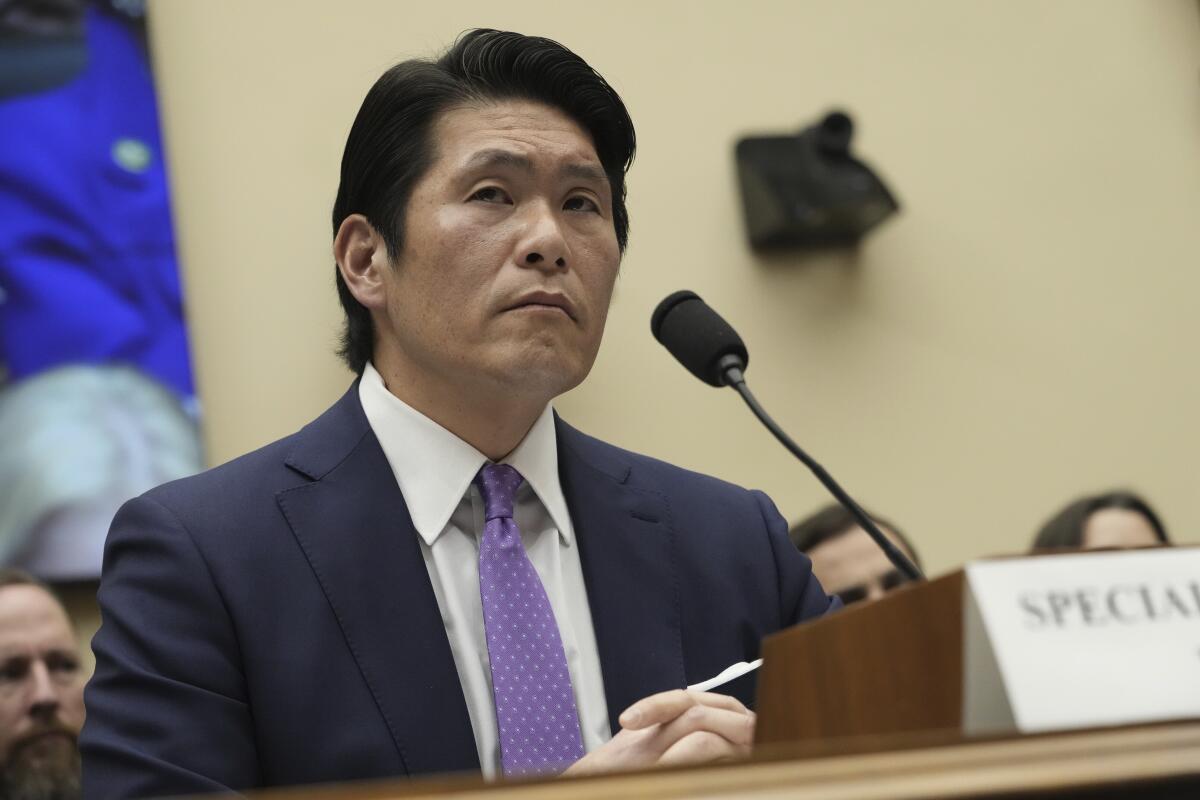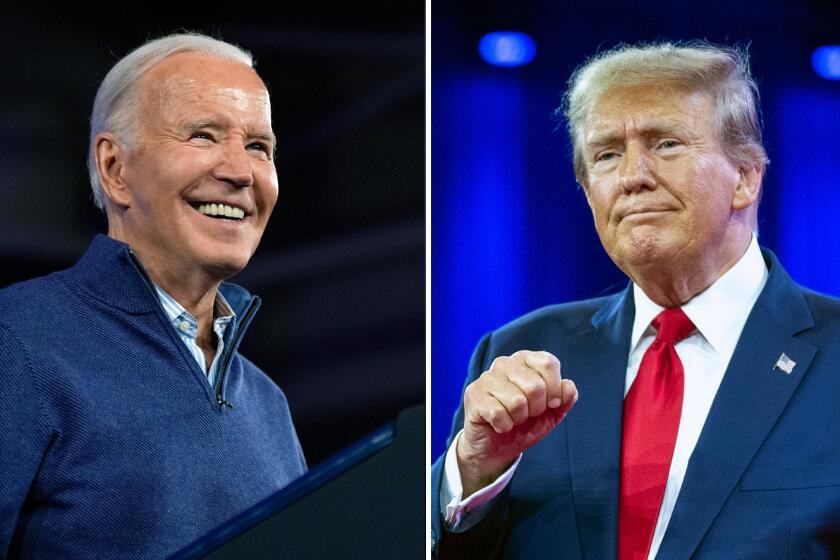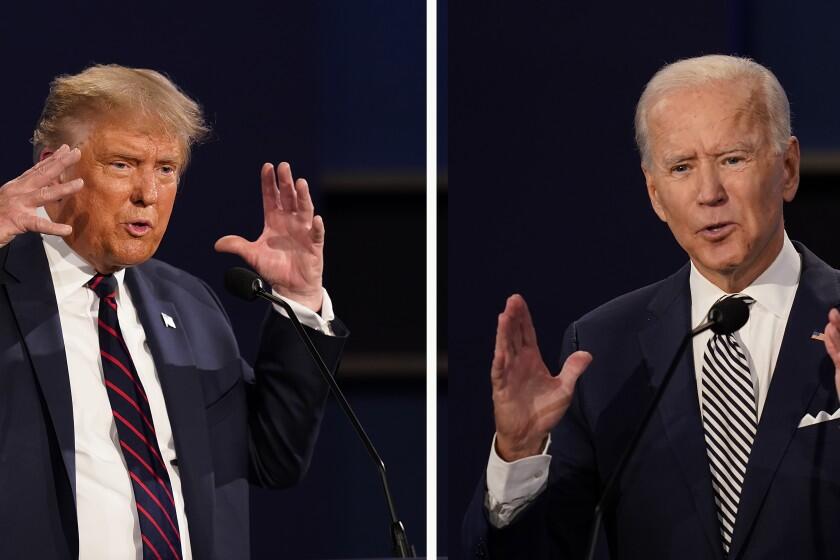Congressional hearing on Biden classified documents probe turns into proxy campaign battle

- Share via
WASHINGTON — Lawmakers turned a hearing on President Biden’s handling of classified documents into a proxy battle between the Democratic president and Republican front-runner Donald Trump on Tuesday, as a newly released transcript of Biden’s testimony last fall showed that he repeatedly insisted he never meant to retain classified information after he left the vice presidency.
Special counsel Robert Hur, testifying for more than four hours before the House Judiciary Committee, stood steadfastly by the assessments in his 345-page report that questioned Biden’s age and mental competence, but recommended no criminal charges for the 81-year-old president, finding insufficient evidence to make a case stand up in court.
“What I wrote is what I believe the evidence shows, and what I expect jurors would perceive and believe,” Hur said. “I did not sanitize my explanation. Nor did I disparage the president unfairly.”
The transcript of hours of interviews between Biden and the special counsel, released Tuesday, provide a more textured picture of the roughly yearlong investigation, filling in some of the gaps left by Hur’s and Biden’s accounting of the exchanges. But there was no guarantee the hearing or transcript would alter preconceived notions about the president, the special counsel who investigated him, or the 77-year-old Trump, particularly in a hard-fought election year.
While Biden was adamant that he’d treated classified information seriously, the transcript shows that he was at times fuzzy about dates and details, and he said he was unfamiliar with the paper trail for some of the sensitive documents he handled.
Tuesday’s hearing played out as Biden and Trump were on the cusp of claiming the Democratic and Republican presidential nominations, respectively, and the party lines calcified almost immediately over which leader had intended to hang on to classified documents, or rather, who “willfully” retained them — and who hadn’t.
And Hur was the rare witness to be vilified all around, by Republicans angry over his decision not to charge the president, and by Democrats for his unflattering commentary about Biden.
Republicans argued that Biden was being given a pass by his own Justice Department and that Trump had been unfairly victimized by prosecutors. Democrats emphasized Biden’s cooperation in the investigation and strongly contrasted that with the separate criminal case against Trump, who had refused to return classified documents to the National Archives that he had at his Florida estate.
Democrats started their questioning by hitting hard at the contrast between Biden and Trump, focusing more on the latter’s criminal case. Rep. Jerry Nadler of New York, the top Democrat on the Judiciary Committee, asked whether Biden’s willingness to comply with investigators and turn over documents contributed to the decision not to charge him.
“That was a factor in our analysis,” Hur said.
But the committee’s Democrats quickly bored into Hur, who was handpicked by Biden-appointed Atty. Gen. Merrick Garland. They suggested he was a political partisan doing Republican bidding with his written slights about Biden’s age and memory. Hur took issue with the characterization.
“Politics played no part whatsoever in my investigative steps, my decisions and the words that in I put in my report,” Hur responded.
Republicans, meanwhile, insisted Trump was being unfairly singled out and vilified, questioning how the two cases were really all that different.
California’s Rep. Tom McClintock (R-Elk Grove) called it a “glaring double standard.”
Biden and Trump offer converging narratives about the country: one optimistic, one apocalyptic. That collision is the core of the 2024 election.
“Donald Trump’s being prosecuted for exactly the same act that you documented Joe Biden committed,” he told Hur.
But there were major differences between the two cases. Biden’s team returned classified documents after they were discovered, and the president cooperated with the investigation by voluntarily sitting for an interview and consenting to searches of his homes. Trump, in contrast, is accused of enlisting the help of aides and lawyers to conceal classified documents in his possession from the government, and of seeking to have potentially incriminating evidence destroyed.
Hur’s report cited evidence that Biden had willfully held on to highly classified information and shared it with a ghostwriter, based on audio of the conversations between the two men in which Biden said he had just come across some classified documents at his home.
According to the transcript, Biden later told Hur that he did not recall that exchange, or that he’d actually discovered any documents. He said that if he’d discussed anything questionable with the ghostwriter, it was in referring to a sensitive 20-page memo he’d written to then-President Obama in 2009 arguing against a surge in U.S. troops in Afghanistan, which he’d wanted to ensure wouldn’t make it into publication.
Hur said he was aware of the need to explain in great detail why he’d decided not to charge the president and why the case didn’t meet the standard for criminal charges. Such explanations are common but are usually kept confidential.
In swing states, where Biden doesn’t have a big Democratic cushion to protect him, the impact of independent and third-party candidates could be enough to swing the outcome to Trump.
But there’s a tradition at the Justice Department of releasing such documents publicly, and so while Hur was working on his report, he almost certainly would have understood that the document was going to see the light of the day.
“The need to show my work was especially strong here,” Hur said. “The attorney general had appointed me to investigate the actions of the attorney general’s boss, the sitting president of the United States. I knew that for my decision to be credible, I could not simply announce that I recommended no criminal charges and leave it at that. I needed to explain why.”
In his interviews, Biden repeatedly told prosecutors that he did not know how classified documents ended up at his home in Delaware and at his former Penn Biden Center office in Washington.
“I have no idea,” he said.
He also insisted that had he known the records were there, he would have returned them to the government.
The president did acknowledge that he had intentionally kept his personal diaries — which officials have said contain classified information. Biden insisted they were his own property and that he had a right to keep them — a claim also asserted by previous presidents and vice presidents.
Biden also acknowledged that he was “never that organized,” as prosecutors pressed him on why the documents were found in different places.
Hur, in his report, detailed how his findings in Biden’s case were far different from special counsel Jack Smith’s findings about Trump, who has been charged with willfully retaining classified documents.
FBI agents searched Trump’s Florida estate in 2022 and removed boxes of documents marked as classified after he refused multiple requests from the National Archives to return them.
Biden has admitted that he’s retained such a sprawling assortment of photos, documents and artifacts from his more than 50 years in public life that he can’t keep track of everything.
When asked whether First Lady Jill Biden kept her things with his, he said, “She wants nothing to do with my filing system” — adding, to laughs from the lawyers, “Not even kidding.”
Biden first sat down with Hur during a time of crisis, one day after the devastating Hamas attack on Israel on Oct. 7.
He entered the first day of the interview having just gotten off the phone with Israeli Prime Minister Benjamin Netanyahu, part of a series of calls meant to prevent the attack from spiraling into a wider regional confrontation. At multiple points, when Hur suggested a pause, Biden encouraged prosecutors to keep going, saying, “I’ll go all night if we get this done.”
Biden said that he’d left it to his staff to safeguard classified information that was presented to him, often leaving papers on his desk in heaps for aides to sort through and secure.
“I never asked anybody” to do so, Biden said. He noted that many on his staff had worked with him for years, to the point that they didn’t need direction from him. “It just — it just got done. I don’t know. I can’t remember who.”
Confusion over the timing of the death of Biden’s eldest son, Beau — who died May 30, 2015 — was highlighted by Hur in his report as an example of the president’s memory lapses. But the transcript shows that Hur never asked Biden about his son specifically, despite what a visibly angry Biden had suggested in comments to reporters the day the report was released.
“How in the hell dare he raise that,” Biden said of Hur and his son’s death. “Frankly, when I was asked the question, I thought to myself it wasn’t any of their damn business.”
But the transcript suggests that the exchange was less revealing about Biden’s memory than Hur let on, and that Biden’s recollection of it during his emotional White House remarks was incorrect.
Hur asked Biden about where he kept the things that he was “actively working on” while he was living in a rental home in Virginia immediately after leaving the vice presidency in January 2017. In that context, it was Biden himself who brought up Beau’s illness and death as he talked about a book he’d published later that year about that painful time.
“What month did Beau die?” Biden mused, adding, “Oh God, May 30th.”
A White House lawyer then chimed in with the year, 2015.
“Was it 2015 he died?” Biden asked.
Biden went on to recount in detail the story contained in his book, “Promise Me, Dad,” of how his late son had encouraged him to remain engaged in public life after the Obama administration ended.
Miller, Long and Amiri write for the Associated Press. AP writer Eric Tucker in Washington and Alanna Durkin Richer in Boston contributed to this report.
More to Read
Sign up for Essential California
The most important California stories and recommendations in your inbox every morning.
You may occasionally receive promotional content from the Los Angeles Times.














